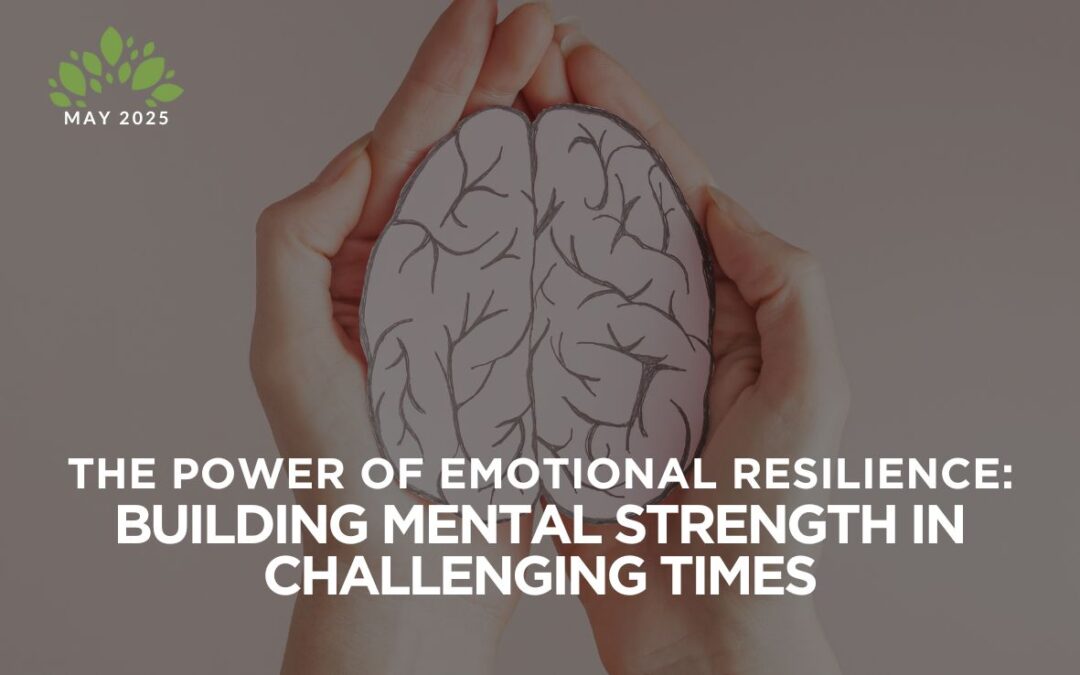Life can be tough. Stress, loss, and mental health struggles are part of the human experience, but emotional resilience helps you face these challenges head-on. This Mental Health Awareness Month, we’re focusing on how you can build your emotional resilience and mental strength. Strengthening this skill helps you manage tough situations and bounce back when life gets hard.
What is Emotional Resilience?
Emotional resilience is the ability to adapt to stress, overcome challenges, and stay balanced during difficult times. It’s not about ignoring problems or pretending everything is fine. Rather, it’s about facing those difficulties, processing them, and finding ways to move forward. Unlike some personality traits, emotional resilience is a skill that anyone can develop. With time, patience, and practice, you can strengthen your ability to handle life’s challenges.
The Science Behind Emotional Resilience
Research shows that emotional resilience is more than just bouncing back; it’s about growth. People who are resilient don’t just survive tough times—they learn and grow from them. This process known as post-traumatic growth, means becoming stronger, more empathetic, and more self-aware after facing hardship.
Several factors contribute to emotional resilience. Early life experiences and genetics influence how we handle stress. Social support, including relationships with friends, family, and therapists, can also strengthen resilience. In addition, practicing mental health strategies like mindfulness and self-compassion helps build emotional strength over time.
How to Build and Strengthen Emotional Resilience
Building emotional resilience doesn’t happen overnight, but it’s a skill anyone can work on. One way to start is by practicing mindfulness and self-awareness. Mindfulness helps you stay present and manage stress more effectively. Paying attention to your thoughts and emotions without judgment can help you better navigate overwhelming situations. Simple techniques like meditation, deep breathing, or even checking in with yourself throughout the day can help calm your mind and reduce stress.
Another important aspect of emotional resilience is surrounding yourself with supportive people. Resilient individuals lean on their support systems—friends, family, and mental health professionals—especially when life gets tough. If you’re feeling isolated, try reconnecting with others. Positive relationships give you the strength and perspective you need when life becomes challenging.
Setting healthy boundaries and prioritizing self-care is also key. Self-care isn’t a luxury—it’s essential. It’s about recognizing when you need rest, when to say no, and when to make time for activities that bring you joy and peace. Whether it’s exercise, hobbies, or spending time with loved ones, taking care of yourself allows you to approach challenges with a clear mind and emotional balance.
Developing positive coping skills can strengthen your resilience. When faced with stress or adversity, healthy coping strategies can make a big difference. Rather than turning to harmful habits like substance use, try engaging in activities that promote emotional wellness. Journaling, physical activity, or creative expression can help you manage emotions and reduce stress.
It’s also helpful to adopt a growth mindset. This mindset encourages you to view challenges as opportunities to learn and grow. Instead of seeing difficulties as obstacles, view them as chances to develop new skills and perspectives. A growth mindset can help you stay motivated and hopeful, even when setbacks occur.
This may seem obvious, but it’s still worth mentioning – be kind to yourself. Building resilience doesn’t mean you’ll never feel overwhelmed or face setbacks—it’s about learning to be patient with yourself as you navigate tough times. Show yourself the same compassion and understanding you would offer to a close friend. Acknowledge your strengths, and celebrate your progress, no matter how small.
Emotional Resilience and Mental Health Recovery
Emotional resilience plays a crucial role in mental health recovery. Whether you’re dealing with anxiety, depression, or addiction, resilience helps you stay focused on healing and moving forward. The ability to bounce back after setbacks is essential for long-term recovery and wellness.
At Aspire Counseling Services, we help individuals build emotional resilience. Through therapy and community support, we guide clients as they strengthen their emotional resilience and develop the tools needed to navigate life’s challenges. Whether you’re struggling with mental health or substance use issues, we provide resources to help you grow emotionally and mentally stronger.
Take the First Step Toward Building Resilience
If you’re ready to work on your emotional resilience, we’re here to help. At Aspire Counseling Services, we offer support through therapy, counseling, and self-care strategies. Together, we can help you build the resilience you need to face life’s challenges with confidence and strength.
Remember, emotional resilience is a skill that anyone can develop. With the right tools and support, you can not only face life’s challenges but thrive through them. If you’re ready to get started, reach out to Aspire Counseling Services today. We’re here to help you build the mental strength needed for a healthier, more balanced future.

